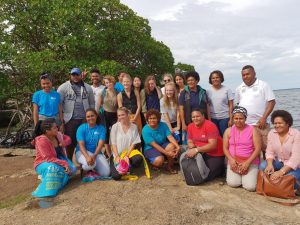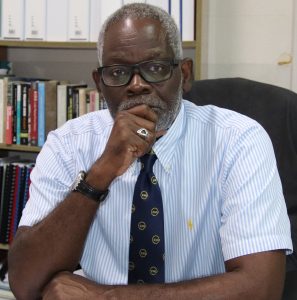

A file image of FNU’s Postgraduate Diploma in Environmental Science and Management students during a field trip.
Discussions on climate change solutions, mitigating response and strengthening climate resilience must be embedded into educational programmes as part of the global effort to address the crisis.
The Fiji National University’s (FNU) Centre for Interdisciplinary Studies and Sustainable Development Director, Professor Nii-K Plange said the effectiveness of these courses provided by higher education institutions could be valued through its provisions of sustainable adaptation and resilient strategies.
“When we discuss and disseminate climate change resilience approaches that benefit our communities and national development, then we have made an impact,” Prof Plange said.
“Having such programmes also enable us to produce a generation of learners who are both climate-conscious and climate literate citizens.”
He said this was a key reason FNU developed the Interdisciplinary Postgraduate Diploma and Masters programme in Climate Change Resilience and Mitigation.
“Until recently, FNU’s various Colleges have provided programmes that deal with climate change or have focused on climate change and its impact on specific sectors, such as health or agriculture,” Prof Plange said.
“What we then did was merge units from these courses to make a composite programme at FNU that discusses climate change from the perspectives of agriculture, health, environment and business and engineering sustainability.”
“Another important note is that the programme emphasises the impact of climate change on cultures and indigenous practices.”

Prof Nii-K Plange.
Prof Plange added that because climate change affected all aspects of society, a collaborative and multidisciplinary approach to the issue was crucial.
He said this was highlighted through his added role as the Co-convener of the Commonwealth Climate Resilience Network (CCRN) of the Association of Commonwealth Universities (ACU).
The Network was established by ACU in partnership with FNU, the University of the South Pacific (USP) and the University of the West Indies (UWI), to link universities directly affected by climate change with those that have expertise in building resilience.
In addition, CCRN aims to directly address the needs of universities and communities whilst providing its members with a platform to connect with policymakers and discuss disaster preparedness and resilience.
“In addition to educating graduates who would then contribute and become allies in addressing climate change issues, FNU through the CCRN has maintained connection and collaboration with other Commonwealth universities whose people are also at the forefront of the environmental impacts,” Prof Plange highlighted.
“Most recently, FNU through the CCRN cohosted an International Webinar on Climate Change, Security and Sustainability of Ocean States last month that brought together academics from Fiji, New Zealand, Sri Lanka, Mauritius, Seychelles and West Indies.”
The webinar was co-convened by Prof Nii-K Plange and MacMillan Brown Centre for Pacific Studies Director, Distinguished Professor Steven Ratuva.
FNU offers various courses in the environmental field, such as the Bachelor of Science (Environmental Science), Bachelor of Environmental Health, Bachelor of Science (Environmental Management), Higher Education Diploma in Environmental Management, Higher Education Diploma in Environmental Science, Post Graduate Diploma in Environmental Science and Management, Postgraduate Diploma in Environmental Health (Disaster Management), Postgraduate Diploma in Environmental Health (Food Safety Management), Environmental Management and Green Productivity and the Postgraduate Diploma and Masters in Interdisciplinary Studies in Climate Change Resilience and Mitigation and Master of Science in Environmental Science and Management.
Interested students can visit our website on www.fnu.ac.fj or email admission@fnu.ac.fj for further information on our programmes, entry requirements and application details.